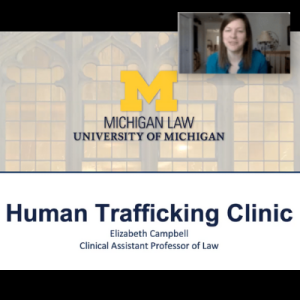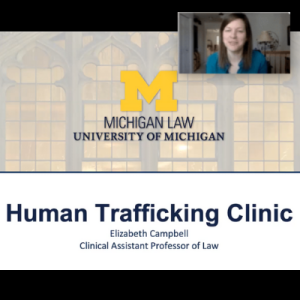What Real Cases Teach us about Human Trafficking


March 2021
When you think of human trafficking, what images come to mind? Last month, Professor Elizabeth Campbell spoke about misconceptions, research gaps, the various experiences and complex needs of survivors of trafficking, in a webinar sponsored by IRWG’s Initiative on Gender Based Violence and Sexual Harassment.
Campbell is a clinical assistant professor and co-director of the Human Trafficking Clinic (HTC) at the University of Michigan Law School. Launched in 2009, the HTC is the first clinical law program solely dedicated to the issue of human trafficking. The clinic trains law students in core advocacy skills and practice providing comprehensive legal services to clients, under the supervision of faculty lawyers. With over a decade of providing legal services to human trafficking victims, Campbell and her students have a unique perspective on the lived experiences, misconceptions, and challenges of data collection surrounding this vulnerable population.
Broadly, under the law, human trafficking is compelled service. It may fall under the category of labor or sex trafficking, which occur through a process of recruiting through coercion, fraud, or physical abuse. Victims may be U.S. or foreign nationals, requiring different engagement with government agencies -- from state level court systems to the federal immigration system.
While sex trafficking is often perceived as the only form of human trafficking in the U.S., Campbell argued that this is a harmful misconception. At the HTC, about 50% of clients are victims of sex trafficking, while the other 50% are victims of labor trafficking. So, which is the bigger problem? “The honest answer is, we don’t know,” said Campbell. Data is collected through various agencies and organizations at local and national levels, and is vastly inconsistent. However, because there are more resources devoted to combatting sex trafficking, Campbell believes labor trafficking is underreported. “We don't actually have great systems set up for identifying victims of labor trafficking, which leads me to believe that it's likely that we have undercounted labor trafficking, even more than potentially the undercounting of sex trafficking that has occurred.” This concerns her because it suggests that the legal system is missing a “whole host of exploited individuals.”
Another troubling misconception is that victims of trafficking are always physically abused. “Fraud and coercion are much more common than physical abuse,” explained Campbell. By presenting only one image of a trafficking situation as being physically violent, “we're creating a set of expectations that lots of survivors would not meet upon telling their story.” By breaking down these stereotypes, Campbell hopes advocates will be better equipped to serve exploited people.
One commonality of her clients at the HTC is that they face some sort of vulnerability or risk factor. This might include having an addiction, a history of trauma, homelessness, or mental illness. Moreover, marginalization based on gender, anti-Black racism, or immigration status can make people more vulnerable. When she’s asked about what people can do to combat human trafficking in their communities, Campbell says: “Advocate for the homeless, advocate for at-risk youth, advocate for survivors of intimate partner violence. These are the ways that you can actually combat human trafficking.”
This series from the Initiative on Gender Based Violence and Sexual Harassment continues through the end of April. On March 19, panelists will discuss the complex experiences of victims of gender-based violence in navigating state and policy programs, from family court to child services involvement to incarceration. Learn more and register.
